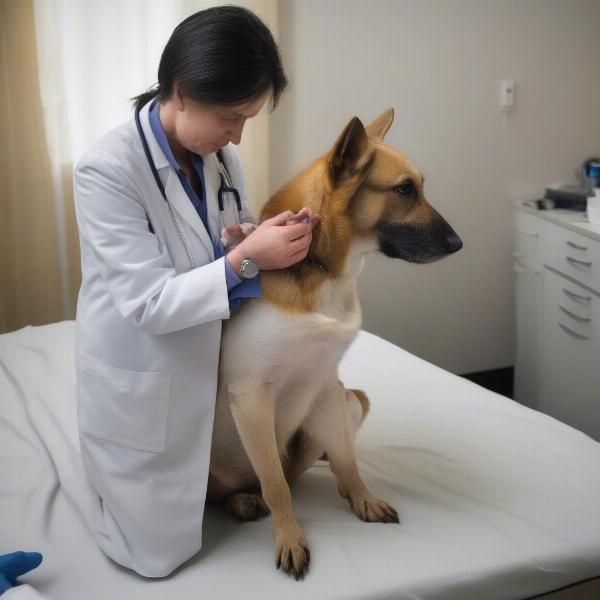Dog bites, regardless of where they occur on the body, are a serious concern for any owner. While bites to the hands and face are more common, bites to the buttocks present unique challenges and require specific understanding. This article explores the reasons behind dog bites to the buttocks, how to prevent them, and what to do if such an incident occurs.
Why Do Dogs Bite Buttocks?
Several factors can contribute to a dog biting someone’s buttocks. These include:
- Playful Nipping: Some dogs, especially puppies, might nip at moving buttocks during play. They may see it as chasing prey or a form of playful interaction. However, even playful nips can be painful and should be discouraged.
- Herding Instinct: Certain breeds, like Border Collies or Australian Shepherds, possess a strong herding instinct. They might nip at heels or buttocks as a way to “herd” people, especially children who are running.
- Fear or Anxiety: If a dog feels threatened or cornered, they might bite as a defensive mechanism. This could happen if someone approaches them from behind or surprises them while they are resting.
- Pain or Discomfort: A dog experiencing pain, especially in areas like the hips or back, might bite if touched near the affected area. The buttocks are relatively close to these sensitive areas, making them a potential target.
- Dominance Aggression: In some cases, a dog might bite as a display of dominance. This behavior is less common than other reasons and usually occurs within the dog’s own social group.
Preventing Dog Bites to the Buttocks
Preventing bites to the buttocks requires a multi-faceted approach focusing on training, management, and understanding your dog’s behavior:
- Early Socialization: Exposing puppies to various people, places, and situations from a young age can help them develop appropriate social skills and reduce fear-based aggression.
- Obedience Training: Teaching basic commands like “sit,” “stay,” and “leave it” can help you control your dog’s behavior and prevent unwanted nipping or biting.
- Recognize and Respect Body Language: Learn to understand your dog’s body language cues. Signs of stress, fear, or anxiety, such as tucked tail, flattened ears, or whale eye, should be taken seriously.
- Avoid Surprising Your Dog: Approach your dog calmly and avoid startling them, especially when they are resting or eating.
- Supervise Interactions with Children: Never leave young children unsupervised with dogs, regardless of how gentle the dog seems. Teach children how to interact appropriately with dogs and to respect their space.
What to Do if a Dog Bites Buttocks
If a dog bite occurs, even if seemingly minor, immediate action is crucial:
- Clean the Wound: Wash the wound thoroughly with soap and water.
- Seek Medical Attention: Consult a doctor, especially if the bite is deep, bleeding heavily, or shows signs of infection. Bites to the buttocks can be particularly prone to infection due to their location.
- Quarantine the Dog: If the dog is not your own, try to identify the owner and ensure they are aware of the incident. If the dog is yours, monitor its behavior closely.
- Report the Incident: Depending on your local regulations, you might need to report the bite to animal control.
Understanding Your Dog’s Behavior is Key
“Understanding the root cause of a dog bite is essential for preventing future incidents,” says Dr. Emily Carter, a certified veterinary behaviorist. “A bite to the buttocks often stems from herding instincts or playful nipping, especially in younger dogs. Addressing these behaviors through training and management is critical.”
 Seeking medical attention for a dog bite
Seeking medical attention for a dog bite
Conclusion
Dog bites to the buttocks, while less frequent than bites to other areas, require careful attention. By understanding the potential causes, implementing preventive measures, and knowing how to respond to a bite incident, you can ensure the safety of both yourself and your dog. Proper training, socialization, and recognizing your dog’s body language are key to fostering a positive and safe environment for everyone.
FAQ
- Why does my dog nip at my buttocks when I run? This could be due to playful nipping, a herding instinct, or even excitement.
- Is a bite to the buttocks more dangerous than a bite to another area? While not necessarily more dangerous in terms of severity, bites to the buttocks are more prone to infection due to their location.
- How can I stop my dog from herding my children? Redirect their herding instinct through appropriate games and training exercises.
- Should I punish my dog for biting? Punishment is rarely effective and can worsen the problem. Focus on positive reinforcement and training.
- What should I do if a stray dog bites me on the buttocks? Seek immediate medical attention and report the incident to animal control.
Connect with ILM Dog for Expert Advice
ILM Dog is your trusted source for comprehensive information on dog care, health, training, and wellbeing. We provide expert guidance on all aspects of dog ownership, from breed selection to senior dog care. Whether you’re a seasoned dog owner or just starting your journey, ILM Dog is here to support you. Contact us for personalized advice and discover a wealth of resources to help you provide the best possible care for your canine companion. Email: [email protected], Phone: +44 20-3965-8624. Connect with us today and let ILM Dog be your partner in responsible dog ownership.